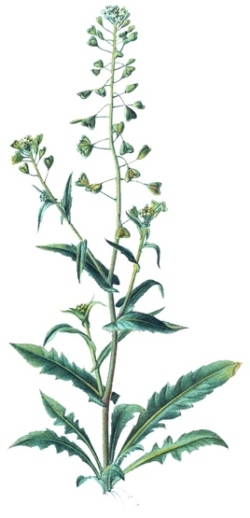System hesabgaran jaban
Ecological knowledge and weed control
Weeds are considered to be the most costly factor to fight against in agriculture. Worldwide, weeds cause more damage to agricultural fields than insect pests, rodents, birds, plant pathogens, and root-feeding nematodes, costing the farmer and his crop. Since the principles and rules of organic agriculture in many countries have prohibited the use of most herbicides, many organic farmers consider weeds that form in their fields to be the most important obstacle to successful organic production. On the other hand, for this reason, organic and effective methods of weed control have become a research priority in the field of agriculture.On the one hand, in the cultivation of most crops, the presence of weeds can be seen as a sign of life, and with a little care and timely weeding, it can be turned into a useful organic material for crop growth. However, weed control costs become increasingly high as the land area (hectares) increases, and at high hectares, it can be whispers of a failed crop. For this reason, ecological understanding of weeds is the background that helps us to have an effective weed management program and makes the difference between success or failure.
If it weren't for weeds, the world would probably have lost a large part of what it has today as topsoil, and without a doubt, mankind would have been struggling with the problem of mass starvation by now.but why? Because a group of plants that we call "weeds" play a key role in establishing ecosystems: they form quickly, protect the soil, and restore the soil that has been exposed to natural or human disturbances. Even some weeds are called "green manure" due to the improvement of soil structure.
In agriculture and horticulture, humans replace the climax community (dominant vegetation of an area) with a collection of domesticated plant species to exploit their crop value as food, fodder, fiber(s), or fuel. Most agricultural systems strongly affect and reduce the diversity of the plant community of ecosystems. Agricultural processes, which are designed to maintain favorable conditions for the growth of selected plant species, impose a frequent disturbance on ecosystems.This disorder inevitably brings "weed reaction" from nature; Especially in annual cropping systems such as vegetables and crops, where the soil is repeatedly prepared for cultivation during tillage operations. Successful chemical or mechanical weed control and managing the natural response of weeds to cultivation begins with an ecological understanding of weeds and their role in the farm or orchard ecosystem.
Functional definition of weed
We generally use the term "weed" for an inappropriate, unwanted plant or a plant that is considered a pest and interferes with crop production or livestock breeding; Such as Rooster's Crown, Oyarsalam, Pig Grass and Crab Grass.Weed manuals and herbicide advertising catalogs also list species such as clover, garden grass, tall fescue, hairy vetch, and Jerusalem artichoke as weeds; Plants that are useful and valuable for many farmers as fodder, vegetation cover or food products if they are grown in the right conditions. In fact, "volunteer crops" such as wheat, barley, forage soybeans or even corn are considered weeds if they appear as a vehicle at an inappropriate and unwanted stage of the crop rotation.
From these examples, we can understand that the term "weed" is partially related to the judgment of humans about certain plants or plant species, the more precise definition of which depends on how that plant intervenes in a certain field or land at a certain point in time.Even alfalfa, one of the most valuable forage crops, is considered a weed in the vegetable garden.
It should be noted that weeds are also largely man-made. Human activities can turn plant species into weeds in two ways:
Providing a suitable ecological environment for the growth of unwanted plants
Importation of new plant species to a certain region or continent
But in practice, any plant that grows in a garden or field that the grower has not planted is usually called a "weed," whether it causes a problem or not. However, efforts to remove unwanted vegetation come with pressure on farm budgets, the farmer himself, agro-ecosystems, fuel resources and the environment. Weed control usually does not require the full length of the weed to protect the desired crop.Based on these considerations, a weed may be defined as any plant that has not been intentionally planted or propagated by the grower and that requires management of the situation to prevent it from interfering with crop production or livestock production. In this definition, a weed is a non-agricultural plant that can become a problem if not adequately managed; But its presence may not always be harmful and at the same time there is no guarantee that it will be eradicated automatically. Weeds can perform vital ecosystem services such as protecting and rehabilitating degraded or degraded soils. In addition, some weeds provide habitat for beneficial organisms and thus contribute significantly to the natural and biological control of some insect pests.Some specific weeds also provide a nutritious food for us or livestock; Many medicinal plants are actually species of this category of car plants.
